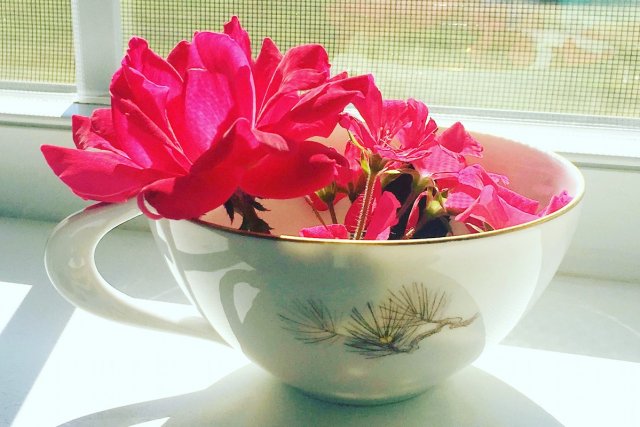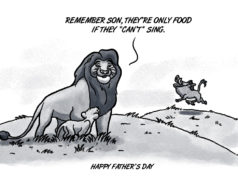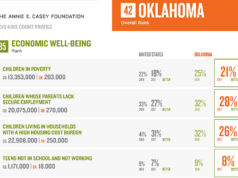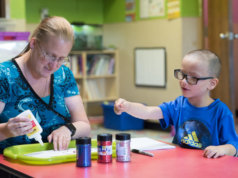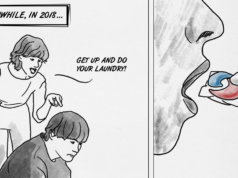TISHOMINGO — I’m deaf, so instead of words, I pay attention to actions. And I’ve noticed that the way a person plucks a flower says a lot about them.
I have two sons, ages 9 and 6. The eldest, impulsive and mechanically inclined, plucks flowers by the head, handing them to me in his palm like an offering. The youngest, a dreamer who likes to gaze at bugs and rocks, grabs flowers by the base of the stem, often wiggling out the roots as well. And then there’s me, always in Mom Mode, looking for the teachable moment. Pointing out the flower’s parts: pistil, anther, sepal.
In my windowsill, one flower stands upright in a Coke bottle; the other floats in a teacup of water. We are a bouquet of differences. It works, until it doesn’t.
After a long day of work, my youngest slips a long-stemmed rose into my hands. He has bent off the thorns to pull it from the base of a massive reddish-pink rosebush that guards our front door.
His brother, angry at me for telling him that he couldn’t see his friends, leans in and asks to see.
No sooner have I handed the flower to my eldest son, he crushes the rose in his fist, a look of triumph in his eyes. Until his gaze meets mine. Those pale green eyes shift to panic — then horror — as he stares at the petals crumpled in his palm.
“Why?” I demand.
“I don’t know,” my eldest stutters. “I-I-I don’t know.”
His answer is not good enough for me. I know. The schools have been closed for months, and he wants to see his friends. And I’m the one telling him, “No, it’s not safe.”
I can’t help but feel this righteous anger sear through me with one glaring thought: How dare he, now of all times, when so much is going on?
Global pandemic. Climate crisis. A country reeling from systemic racism. Massive layoffs.
And here I am, angry about a rose.
My youngest isn’t even crying. He stares at us with a confused uneasiness, as if his brother and I are two boxers in a ring.
How dare he, I think, when I am so exhausted and trying so hard to keep it together? Every day is a new challenge, and my role evolves from working parent to internet instructor to fledgling homeopathic physician, desperate for any home concoction to protect my children. Bee pollen, elderberry syrup, beet juice. I tell them, “We have to build up our immune system…” But I don’t finish the thought: Just in case. Because I don’t know what works. Because I love you so much, and I don’t want to lose you.
How dare he when I am trying my best to adjust to what is now and may never be again, longing for the comforts of a world that seems to be swiftly receding in the rearview mirror?
And then I realize this is the world he is growing into. For everything I have lost as an adult, he has lost as a child.
This ball of tension tightens into a building scream with nowhere to go.
But instead of yelling, I think of the previous night, how he had trouble sleeping. How no matter how much I try to protect him from the news, he always seems to know because he’s so daggum smart. And so I choke out, “It’s a lot, you know?”
His eyes meet mine with so much understanding, my chest feels as if it’s split open with the pain of it.
I teach my sons that they are not bad kids. They’re just people, and people make mistakes. Lord knows I do.
But maybe it’s these imperfections that will save us in all this. Because even as we physically isolate our bodies, we can’t isolate our humanity.
The next day, I spot my eldest son near the rose bush. He glances up as I step closer and says, “I’m trying to pick the best one, but it’s in the thorns.”
Resting a hand on his shoulder, I consider the dilemma.
“You know,” I say, “you don’t have to pick flowers for me. I love you. No matter what.”
He pauses to study me, those brows furrowed as if I am a cypher to puzzle out, like one of the intricate robots he assembles in the den.
“But if you’re willing to pick me roses,” I continue, “I’ll take as many as I can get.”
He smirks. “They won’t have stems.”
With a shrug, I squeeze his shoulder. “That’s what teacups are for.”









